Jane Mead
Substance Abuse Trial
Jane Mead’s “Substance Abuse Trial” is set in a courtroom where a daughter hears her father’s name mispronounced at his trial. As she watches this, she wishes that the court could see the fullness of her father and his story — to bear witness to him as a human being, defined by much more than his addiction.
A question to reflect on after you listen: When was a time when you were judged based on a mistake you made, rather than the fullness of who you are?
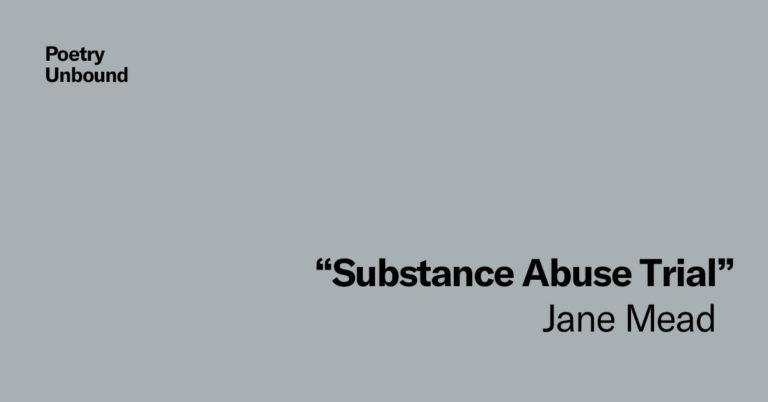
© All Rights Reserved.
Guest
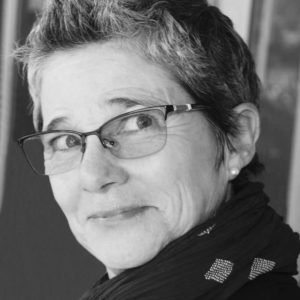
Jane Mead authored five poetry collections during her life including The Lord and the General Din of the World, The Usable Field, and World of Made and Unmade. Winner of a Griffin Poetry Prize and a Los Angeles Times Book Prize finalist, Jane taught at various institutions throughout her life including Colby College, Washington University, and New England College. She was a long-time poet-in-residence at Wake Forest University in North Carolina. She died on September 8, 2019.
Transcript
Pádraig Ó Tuama, host: My name is Pádraig Ó Tuama. I’m a poet from Ireland. And poetry has helped me feel seen since the day I read a stanza from the Aran Islands off the west coast of Ireland, Máirtín Ó Direáin. And the stanza says, [Irish]. And the translation of that is difficult, but it says something like “As lonely as a tree in the middle of the wood is, so is a poet among the people.” And I remember reading that poem and learning it off by heart when I was ten, and I didn’t know why, but I knew that the honesty about the reality of loneliness helped me say something that I knew would be important for the rest of my life.
[music: “Every Place We’ve Been” by Gautam Srikishan]
“Substance Abuse Trial” by Jane Mead.
“He mispronounces you,
the judge, rhyming your first
with your second name,
making you into something
ridiculous: Gillis Willis Mead.
But you stand as still
as they taught you in the army
when you were a young man trying hard
to keep secret what you knew
about how to kill with germs.
As quietly as we used to stand
on the front porch together at dusk
listening for the first cricket of the evening.
Now you stand accused
of wanting to die, of saying so
endlessly, with needles—and the speechless
track marks recording it all.
The evidence is
a red river, mounting.
It wants to carry you
away like an old chair
some fisherman forgot
to take home. And I want
to shout: listen
—this man
is my father.
I love him.
Is there a place
where all those things
that catch in the throat
gather and shape themselves
into something as soft
as the G in Giles
was meant to be pronounced?
Is that where you thought
you were going?”
There’s such drama in the poem. There is a judge, who is mispronouncing the name of her father. At no point is the poet, Jane Mead, trying to speak about innocence. So there is a pronouncement happening. There’s some kind of sentence about to be passed down. There is war. There are memories of waiting for crickets. And there’s the speechless track of the desire to end a life and then the daughter wanting to shout in a courtroom, “I love him.” And the entire drama of that is so pronounced. And then it all resolves itself into this question about where does he want to go, and thinking about his name, “Gillis Willis Mead.”
Jane Mead is not protesting his innocence. But she’s wanting to say, “Get his name right.” And “He mispronounces you” — she doesn’t say, “He mispronounces your name.” “He mispronounces you” — that there’s somehow a location of the name that’s close to the source of self. And when not only yourself, but people who love you, hear your name, they want to hear that the person has gotten it right, even in this most awful circumstance of a trial.
The desire that Jane Mead has to shout in the middle of the trial — she says, “listen / —this man / is my father. / I love him.” She’s not saying, “This broken man once was my father, and I used to love him,” or “I could love him,” or “he tried to love me.” There’s absolute perfect precision: “This man / is my father. / I love him.” Not for who he could be, not for who he was before he lost himself, not for anything other than who the person is, standing here, right here, right now. And I think that is an extraordinarily brave and powerful proclamation of love, and one I’m not sure I’m capable of. I listen to the speaker of this poem and think, “Who are you?” Listen to that love — what an extraordinary tidal wave of love, compassion, understanding, independence, and gathering we hear, coming from the voice of the poet.
I find myself thinking back to certain things that happened. There’s various things that happened in my late teens. I went through exorcisms and reparative therapy for trying to “cure” me of being gay. And I’m so far away from that now — I am turning to it in poetry and writing poetry about these things — and I recognize that there is a tide of anger that you can be brought into. And that’s good, because I’ve needed that in order to be able to shape art from it and to shape a story and to shape distance and to put a chapter end to certain things. But what it shows me is that I don’t love these people. I don’t want to hate them, either, but I don’t love them. And Jane Mead’s poem brings me to the idea of, what about in a situation where people have lived very complex lives with each other in a close friendship or close family unit, and to pay attention to what love does to the context of blame or recrimination or retribution in those circumstances?
And that’s not a template to apply to anybody else. This is what she’s doing in this context to her father, and I find it very moving. She’s not saying, “Oh, therefore, this is what everybody should do in these circumstances,” because a different story, a different poem, a different life would say, “I’m not even gonna go to that trial. I’m going to stay away.” So I don’t think this poem is proposing the way things should be, this poem is saying, “This is what this was like for me. I love him.” And I find that so moving, because there isn’t any sermonizing in Jane Mead’s poetry. She is not telling anybody what to do with their life. She’s saying, “Here’s what I’m doing.”
“Substance Abuse Trial” by Jane Mead.
“He mispronounces you,
the judge, rhyming your first
with your second name,
making you into something
ridiculous: Gillis Willis Mead.
But you stand as still
as they taught you in the army
when you were a young man trying hard
to keep secret what you knew
about how to kill with germs.
As quietly as we used to stand
on the front porch together at dusk
listening for the first cricket of the evening.
Now you stand accused
of wanting to die, of saying so
endlessly, with needles—and the speechless
track marks recording it all.
The evidence is
a red river, mounting.
It wants to carry you
away like an old chair
some fisherman forgot
to take home. And I want
to shout: listen
—this man
is my father.
I love him.
Is there a place
where all those things
that catch in the throat
gather and shape themselves
into something as soft
as the G in Giles
was meant to be pronounced?
Is that where you thought
you were going?”
Lily Percy: “Substance Abuse Trial” comes from Jane Mead’s book The Lord and the General Din of the World. Thank you to Alice James Books, who published the book, and to The Permissions Company, who let us use Jane’s poem. Read it on our website at onbeing.org.
Poetry Unbound is Tony Liu, Chris Heagle, Kristin Lin, Erin Colasacco, Serri Graslie, Eddie Gonzalez, and me, Lily Percy. Our music is composed and provided by Gautam Srikishan. This podcast is produced by On Being Studios, which is located on Dakota land. We also produce other podcasts you might enjoy, like On Being with Krista Tippett, Becoming Wise, and This Movie Changed Me — find those wherever you like to listen or visit us at onbeing.org to find out more.
Books & Music
Recommended Reading
The On Being Project is an affiliate partner of Bookshop.org and Amazon.com. Any earnings we receive through these affiliate partnerships go into directly supporting The On Being Project.






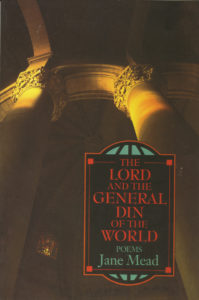
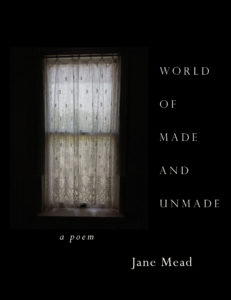
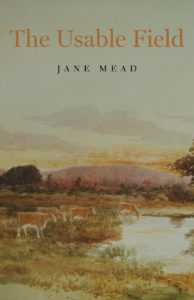
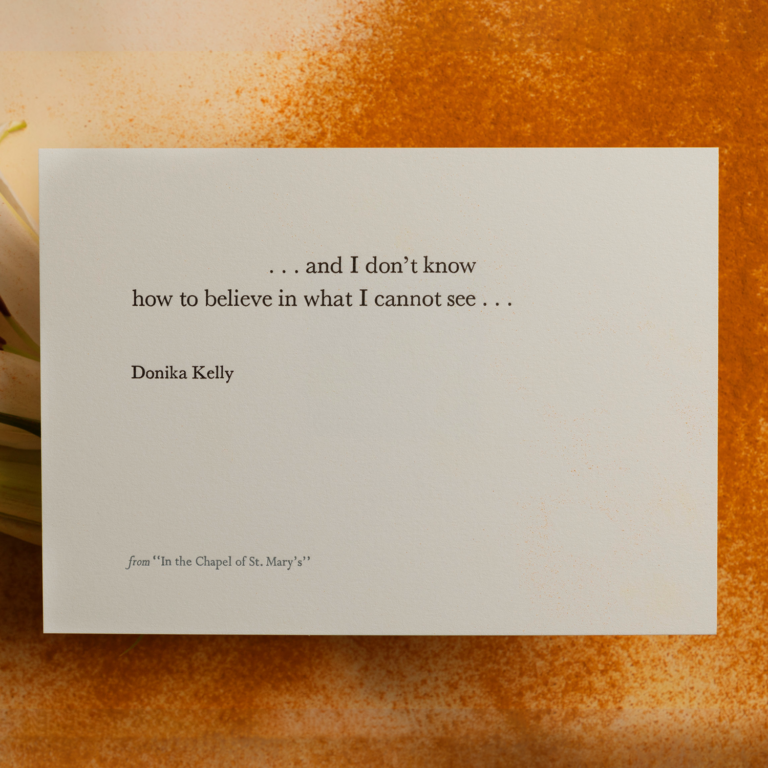
Reflections